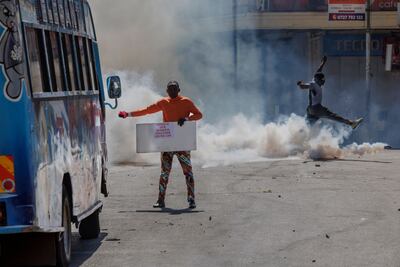Kenyan President William Ruto said on Wednesday he will not sign into law a finance bill proposing new taxes, a day after protesters stormed parliament and at least 20 people were shot dead by security forces.
The government wanted to raise funds to pay off debt but Kenyans said the bill would cause more economic pain as millions struggle to get by.
The chaos on Tuesday led the government to deploy the military and Mr Ruto called protesters' actions “treasonous”. It was the biggest assault on Kenya’s government in decades.
The death toll from the crackdown has risen to 22, according to the state-funded Kenya National Commission on Human Rights, which has pledged to investigate.
On Wednesday, the President said the bill had caused “widespread dissatisfaction”, that he has listened to the people and “conceded”. It is a major setback for Mr Ruto, who came to power vowing to help Kenyans cope with rising costs but has seen much of the country unite in opposition to his latest attempt at reforms.
"It is necessary for us to have a conversation as a nation on how we manage the affairs of the country together,” the President said.
The White House said it condemned the violence in Kenya, where thousands took to the streets in protest this week.
"We offer our deepest condolences, of course, to the families who have been impacted by this violence, and we continue to urge restraint so that no further people are put in harm’s way while exercising their right to peaceful public assembly," national security spokesman John Kirby said.
"The United States has been in touch with the Kenyan government to urge appropriate use of force by the police to respect human rights and, quite frankly, to respect due process for those that have been detained, and we will continue to push for calm to prevail," he said.
Earlier in the day, Kenyan protesters had vowed to keep up their demonstrations against new tax increases, a day after police opened fire on crowds trying to storm parliament, leaving at least eight dead and scores injured.
As heavily armed officers patrolled the streets of the capital Nairobi, supporters of the week-old protest movement took to X, using the hashtag #Tukutanethursday, or "see you on Thursday" in a mix of Swahili and English.
An online outpouring of anger over rising taxes has swelled into a nationwide protest movement calling for a political overhaul, in the most serious crisis of Mr Ruto's two-year-old tenure.
Many social media users focused on Mr Ruto's speech after the clashes, in which he said the attack on parliament was the work of "criminals pretending to be peaceful protesters".
"Good morning fellow CRIMINALS Tupatane Thursday To do what CRIMINALS do," one X user posted.
Nairobi's main public mortuary received the bodies of six people killed in Tuesday's protests, a police officer told Reuters. Another two bodies and 160 people with injuries were taken to Kenyatta National Hospital, health officials said.
Mr Ruto said in his televised address to the nation late on Tuesday that the debate about the tax measures – passed only minutes before the parliament building was stormed – had been "hijacked by dangerous people".
The government called in the army to help police deal with a "security emergency", though there were no reports of troops on the streets of Nairobi on Wednesday.
Last week, protesters circulated a schedule that called for the occupation of parliament on Tuesday and of State House, the President's office and residence, on Thursday.
Protester Wellington Ogolla said he would head back out on to the streets. "It's our right to demonstrate ... we are just expressing ourselves," he told Reuters as he walked through central Nairobi, where the smell of tear gas lingered.
Many said they had had enough of a political system under which the major parties took turns in power and funnelled jobs and opportunities to supporters and people from their own ethnic groups.
"Our parents failed us. They voted along tribal lines," Derick Kolito, 26, said. Despite having a master's degree in accounts he said he has been unable to find a job.
"I am the son of peasants," he added. "You must have a godfather to get a job ... I wish I was born in another country."

Mr Ruto won an election almost two years ago on a platform of championing Kenya's working underprivileged but has been caught between the competing demands of a hard-pressed population and lenders such as the International Monetary Fund, which is urging the government to cut deficits to obtain more funding.
The protest movement, which has no formal leadership and has primarily been organised on social media platforms, drew thousands of supporters in dozens of towns and cities on Tuesday.
Divisions among the main ethnic groups have traditionally been a key driver of politics and protest in Kenya, with members of one group coming out against what they see as favouritism towards another.
Westen Shilaho, a scholar who has studied Kenyan protest movements, said the political elite have traditionally used "the ethnic card" to enhance their own power.
"Now that that one is not working in this context, they will try to insert the class card," he said.




















